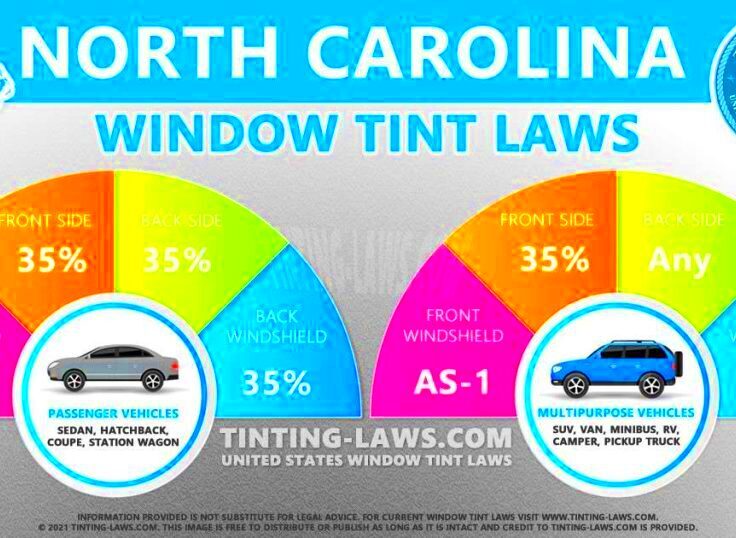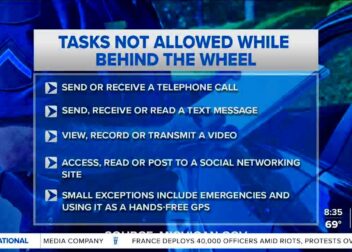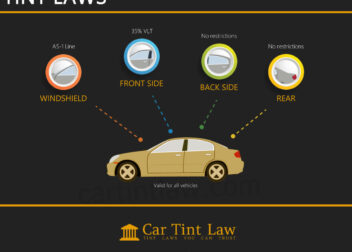North Carolina Window Tint Law for 2024
Understanding the window tint law in North Carolina is essential for anyone considering tinting their vehicle. These regulations aim to balance personal preference with safety. In 2024, it’s important to stay informed about what is permissible to avoid penalties. This guide will break down the key aspects of the law, including legal limits, exemptions, and best practices for choosing a window tint installer.
Overview of Window Tinting Regulations
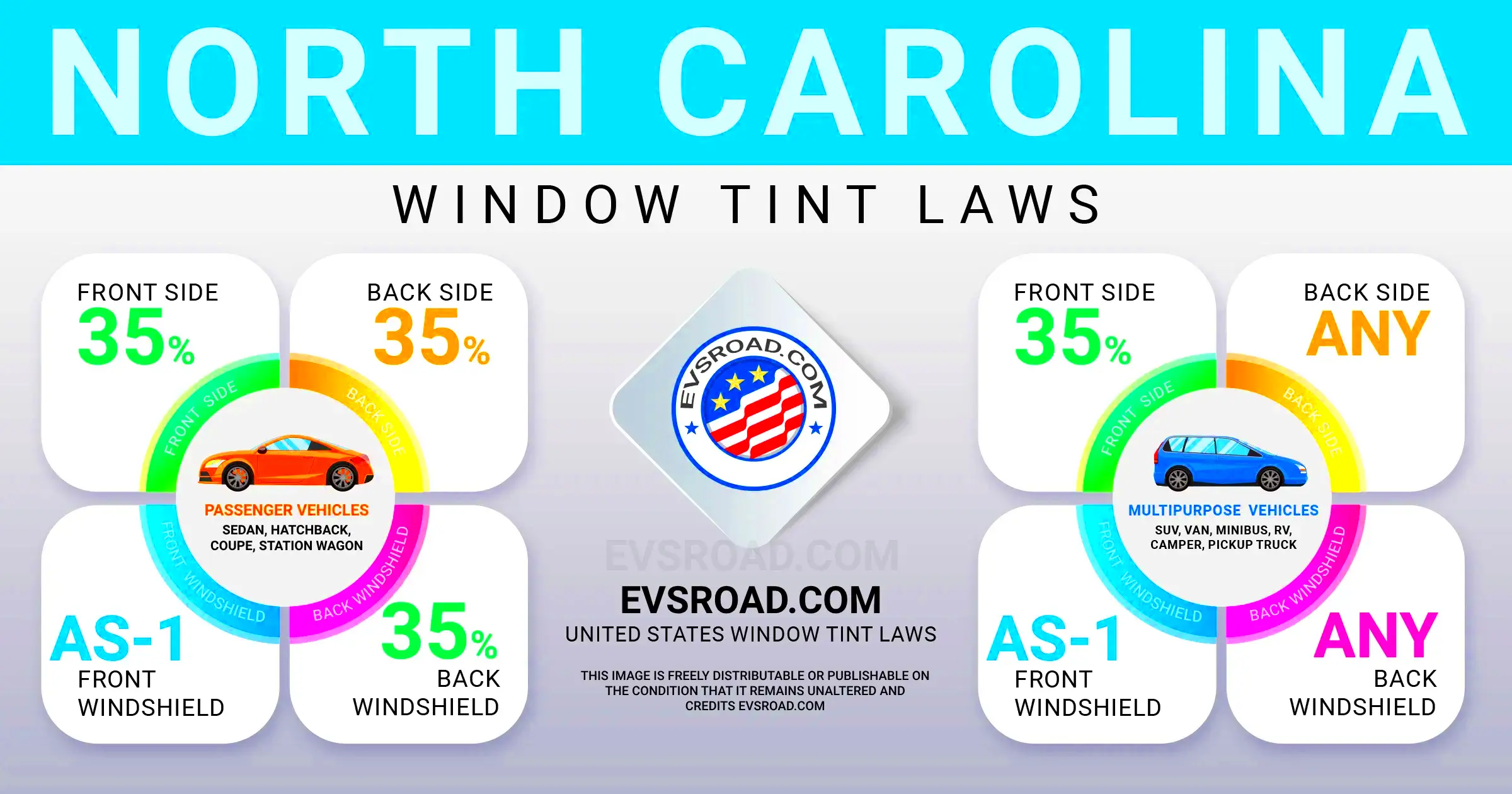
Window tinting in North Carolina is regulated to ensure visibility and safety on the roads. The laws dictate how dark or reflective the tint can be on various windows of a vehicle. These regulations are designed to protect drivers, passengers, and pedestrians from issues that may arise from overly dark tints. Here’s a quick overview of the key points:
- Visible Light Transmission (VLT): This percentage indicates how much light can pass through the window. The lower the percentage, the darker the tint.
- Windshield Restrictions: There are specific limitations for the front windshield and front side windows to ensure drivers can see clearly.
- Rear Window Regulations: The rules differ for back windows, providing more flexibility.
- Reflectivity Limits: Regulations also specify how reflective a window tint can be, ensuring it doesn’t hinder visibility.
Legal Limits for Windshield Tint
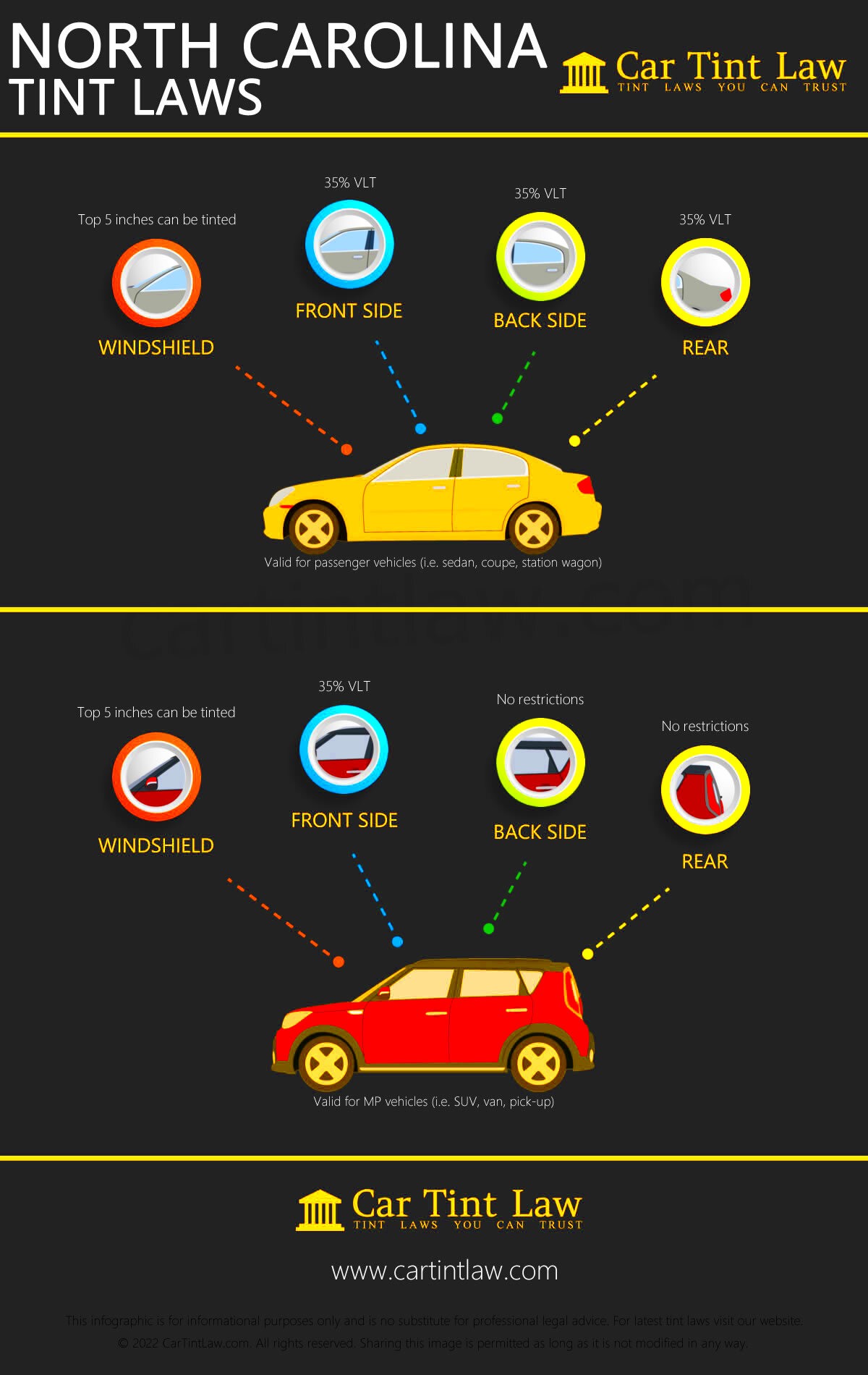
In North Carolina, the windshield tinting law is quite specific. Here are the main points to keep in mind:
- The front windshield must have a minimum of 70% VLT. This means that at least 70% of light must be able to pass through.
- The tint can only be applied to the top portion of the windshield, known as the visor strip. This strip can be tinted, but it cannot exceed 5 inches from the top of the windshield.
- Any tint applied must not be reflective; the law prohibits any mirror-like finishes.
These rules ensure that drivers maintain a clear view of the road while still having some level of sun protection. Failure to adhere to these limits can result in fines and the requirement to remove the illegal tint.
Legal Limits for Front Side Windows
When it comes to front side windows in North Carolina, the regulations are straightforward but essential for safety. The law aims to strike a balance between comfort and visibility for drivers and passengers. Here’s what you need to know:
- The front side windows must allow at least 35% VLT. This means at least 35% of the light must pass through the tinted glass.
- Like the windshield, front side windows cannot have a reflective finish. The goal is to prevent distractions for other drivers on the road.
- Tints that exceed the legal limits can lead to fines and even the requirement to remove the tint, which can be a hassle.
By adhering to these regulations, you can enjoy the benefits of window tint while ensuring you’re in compliance with state laws. It’s always a good idea to consult with a professional installer who knows the local laws to avoid any issues.
Legal Limits for Back Side Windows and Rear Windows
When it comes to the back side and rear windows, North Carolina’s regulations are more lenient compared to the front windows. This allows for greater flexibility while still prioritizing safety. Here are the key points:
- No VLT Restrictions: The law does not specify a minimum percentage of visible light transmission for back side and rear windows. This means you can opt for darker tints if you prefer.
- Reflectivity Limits: Similar to the front windows, back side and rear tints must also avoid excessive reflectivity. While you have more freedom in choosing darkness, safety remains paramount.
- Professional Installation Recommended: Even though there are fewer restrictions, it’s crucial to have these windows tinted by a professional who understands the regulations. This ensures compliance and can help avoid future issues.
With these guidelines, you can customize your vehicle’s look and privacy without worrying about legal penalties. Just remember to choose wisely to maintain safety on the roads!
Exemptions and Special Cases for Window Tinting
While the North Carolina window tint laws are generally clear, there are some exemptions and special cases that can apply. Understanding these exceptions can help you make informed decisions about your tinting options. Here’s a breakdown:
- Medical Exemptions: If you have a medical condition that requires protection from sunlight, you might qualify for a medical exemption. This typically requires a doctor’s note.
- Factory Tint: Some vehicles come with factory-tinted windows that meet the legal requirements. It’s important to know that these factory tints are usually compliant and don’t require any modifications.
- Commercial Vehicles: Different regulations may apply to commercial vehicles, which can sometimes have different tinting requirements based on their use.
If you believe you qualify for an exemption, be sure to keep proper documentation, as law enforcement may ask for proof. Always check with local authorities or a legal expert if you’re unsure about your specific situation. This way, you can enjoy your tinted windows without any legal hassles!
Penalties for Violating Window Tint Laws
Getting your windows tinted can enhance your vehicle’s look and comfort, but violating North Carolina’s window tint laws can lead to serious consequences. Understanding the penalties is crucial to avoid unwanted fines or legal issues. Here’s what you need to know:
- Fines: If you’re caught driving with illegal window tint, you could face fines ranging from $100 to $250. The exact amount often depends on the severity of the violation and whether it’s a repeat offense.
- Required Tint Removal: In addition to paying fines, you may be required to remove the illegal tint immediately. This can be an added expense and inconvenience, especially if you just installed it.
- Traffic Stops: Law enforcement may stop your vehicle if they notice your tint doesn’t meet legal requirements. This can lead to additional checks and even potential citations for other violations.
- Insurance Consequences: Having illegal tint can also impact your car insurance rates. If you receive tickets or get into accidents due to visibility issues, your insurance company might view this as a liability, potentially increasing your premiums.
To avoid these penalties, always ensure your window tint complies with the law. When in doubt, consult with professionals who understand the specific regulations in North Carolina.
How to Choose a Window Tint Installer
Choosing the right window tint installer is just as important as selecting the right tint. A professional installer can help you navigate the laws and ensure your tint meets the legal requirements. Here are some tips for making the best choice:
- Research Local Installers: Start by searching for window tinting shops in your area. Look for reviews and ratings on platforms like Google or Yelp to gauge their reputation.
- Check Certifications: Ensure the installer has the necessary certifications. This shows they’re knowledgeable about the laws and skilled in their craft.
- Ask About Warranties: A reputable installer should offer warranties on their work. This protects you in case of bubbles, peeling, or other issues.
- Get Estimates: Don’t hesitate to get quotes from multiple installers. Compare prices but remember that the cheapest option isn’t always the best. Quality should be your priority.
- Discuss Tint Options: A good installer will help you understand your tint choices and how they comply with state laws. They should provide clear information on the visible light transmission percentages and reflectivity.
Taking the time to choose the right installer can save you from potential headaches and ensure that your tinting experience is smooth and compliant with the law.
FAQs about North Carolina Window Tint Law
Many people have questions about window tint laws in North Carolina. Here are some frequently asked questions to help clarify any confusion:
- What is the legal tint percentage for my vehicle?
The legal tint percentage varies depending on the window. For front side windows, it must be at least 35% VLT, while the windshield must have a minimum of 70% VLT. Back side and rear windows have no restrictions. - Can I tint my windshield?
Yes, you can tint your windshield, but it must comply with the 70% VLT rule and can only be tinted at the top (the visor strip) for up to 5 inches. - Are there exemptions for window tint?
Yes, medical exemptions are available for individuals with certain health conditions. You’ll need to provide documentation from a healthcare professional. - What happens if I get pulled over for illegal tint?
If stopped for illegal tint, you may receive a citation and be required to remove the tint. It can also lead to fines. - Is it safe to have dark window tints?
While dark tints can provide privacy and sun protection, they can reduce visibility. Always choose a tint that complies with the law to maintain safety.
These FAQs should help you understand the basic requirements and considerations for window tinting in North Carolina. If you have more specific questions, don’t hesitate to consult a local expert.
Conclusion on Window Tinting Regulations in North Carolina
Understanding window tinting regulations in North Carolina is essential for every vehicle owner looking to enhance comfort and aesthetics. The state has set clear guidelines regarding the legal limits for window tinting to ensure safety for all road users. By following these regulations, you can enjoy the benefits of tinted windows while avoiding fines and legal issues. Always remember to consult with professional installers who are familiar with local laws to guarantee compliance. Staying informed about any changes in legislation is also crucial, as laws can evolve. Ultimately, a well-informed decision about window tinting can improve your driving experience without compromising safety.
